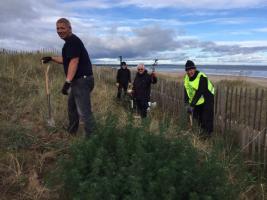British Coinage and the Run-up to Decimalisation
Tue, Dec 8th 2020 at 7:00 pm - 8:30 pm
Reception - Gordon Moir,
Member Bruce Clark is well-versed in the use of coinage having learned his trade in banking. He is indeed a numismatist of some note and went on to give a comprehensive presentation on coins and their derivation up to the introduction of decimal coinage in the UK on February 15, 1971.
Bruce said his induction into banking prompted his interest in working with “hard cash” – coins, in fact. LSD – pounds, shillings and pence - was the norm back them, and Bruce discovered this referred to “librum solidus denarius”. From Roman times when a pound of silver was divided into 240 pence – the “denarius”.
Monday February 15, 1971 became known as “Decimal Day” when the old currency was replaced. Some 5p and 10p coins had been in circulation for three years prior to that so folk could get used to the new coinage.
The banks were closed for four days before changeover to prepare. Currency converters were available for everyone and prices in the shops were shown in both currencies. This went some way to alleviate the feeling many people had, that shopkeepers might use the conversion from old money to new to increase prices!
Bruce then explained that decimalisation was far from being a new concept. In 1696 Sir William Petty and then Christopher Wren announced that “ten cessimal” division would be the way to go for accounting.
By 1960 Britain was lagging well behind the rest of the world, most of which had embraced decimal currency. Nowadays, only two countries remain “undecimalised” - Mauritiania and Madagascar.
To prepare for Decimal Day, in 1967 a new Royal Mint was built near Cardiff and proceeded to turn out some 200 million coins.
In 1969 the 50p piece replaced the 10 bob note.
In the bank, Bruce and his colleagues all over the country were tasked with collecting old coinage, keeping it separate from the new stuff and returning it to HQ. Old LSD was phased out entirely in the ensuing 18 months.
As a footnote, Bruce referred to an occasion when his wife Mary – who he met while working in the bank – had to give evidence to the Great Train Robbery court case. In her Dundee branch she had handled and cashed up banknotes which had been stolen on the trip south.
In a vote of thanks, Gordon Moir noted that probably the bulk of the UK population had never used LSD. He stated that he too had a small collection of coins. Small, because he regularly had great trouble persuading his golfing mates to part with their cash when on the losing side!
'What We Do' Main Pages:
